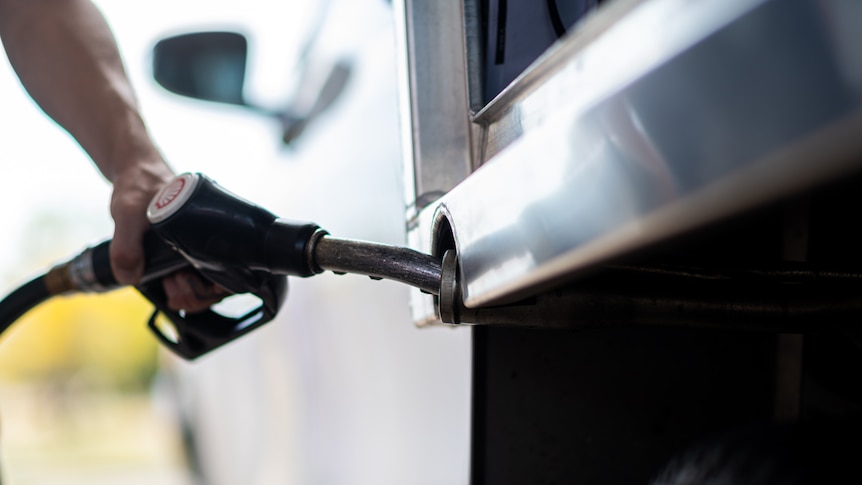Pressure is growing on the Northern Territory government to take action on stubbornly high fuel prices, with calls for a fresh inquiry to quiz retailers on the reasons behind the rates.
Key points:
- Drivers in Darwin were paying $1.95 a liter on Tuesday, while the average price in NSW was $1.67
- The opposition wants fuel companies and retailers to explain their prices in parliament
- Chief Minister Natasha Fyles says she’s written to the Australian Competition and Consumer Commission
Drivers in Darwin were paying around $1.95 a liter for petrol on Tuesday, despite the wholesale price sitting close to the average of interstate capitals of $1.59.
The average price per liter in New South Wales was $1.67, almost 30 cents a liter cheaper than the Northern Territory.
Opposition leader Lia Finocchiaro has called for a new parliamentary inquiry, which she said could potentially recommend a cap on profits or prices.
“Territories are paying [up to] 40 cents a liter more for their fuel compared to any other jurisdictions in the nation,” Ms Finocchiaro said.
“The power of an inquiry means that we can call fuel retailers and fuel companies to sit at the table and they have to explain to the public and the parliament why it is that territories are paying so much.”
Petrol prices this year rose higher in the Northern Territory than in any other jurisdiction, according to the latest official data.
“Automotive fuel” was up by 6.2 per cent, well above the capital city average of 4.2 per cent.
The Northern Territory opposition is also proposing legislation that would force retailers to publish their profit margins.
In a statement, Chief Minister Natasha Fyles said the government “stood ready to take further action” if apparent profit margins remained high “without a reasonable explanation”.
Ms Fyles said she had written to the Australian Competition and Consumer Commission (ACCC) and to fuel companies on the issue but did not say what she had told, or asked, them.
‘There would be higher’ at similar prices in Sydney or Melbourne
FuelTrac general manager Geoff Trotter said the Northern Territory was not without options that are already available, pointing to laws dating back to 1949 that can empower a Consumer Affairs Commissioner to set a maximum fuel price.
Such a step can be taken during a natural disaster or “to effectively ensure that consumers benefit from the operation of a competitive market within all or a part of the territory”.
Former chief minister Michael Gunner previously threatened to create a profit cap when petrol stations were making similar margins of around 35 cents a liter in 2020.
Mr Trotter said residents in the Northern Territory, Tasmania and the Australian Capital Territory were all suffering through high fuel prices because they attracted less attention than larger capital cities.
“The only thing that has worked in the years I’ve been in the game is when the chief ministers have threatened to invoke that emergency price-setting legislation,” he said.
“[Petrol companies] can do absolutely whatever they like.
“If they were charging the prices they are charging in Darwin … in Sydney or Melbourne or Brisbane, there would be absolute uproar. It would be on the news, there would be politicians being asked all these embarrassing questions.”
Costs driving tourists, residents of Alice Springs
Petrol prices are even more expensive in remote parts of the territory, with Alice Springs motorists still paying more than $2 a liter to fill up.
The town’s Mayor, Matt Paterson, said the cost was combining with other factors to drive people away from living in the region.
“Everything is so expensive that it’s sending people to breaking point,” Cr Paterson said.
“Air fares, petrol prices, house prices — it’s just horrendous at the moment.”
Cr Paterson said that “no one can justify” why fuel prices were so much higher in Alice Springs, but expected Territory Labor would not support the opposition’s call for an inquiry.
“I just want people to know we are getting the raw end of the stick, continuously,” he said.
Federal Labor MP Luke Gosling said the Commonwealth needed to ensure the ACCC “has got the teeth to enforce fairness and transparency.”
“But that may end up being also a role for the Northern Territory government, to ensure that there is that sort of transparency from fuel retailers,” Mr Gosling said.
“The fuel retailers should stop gouging territorians and people in other places in the country where they are clearly at the moment.”
Mr Gosling said the fuel excise tax was unlikely to be extended beyond September, citing the state of the federal budget.
Loading form…
.
